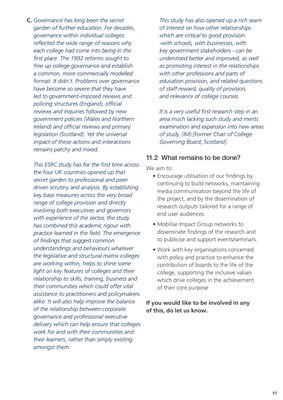
57
C. Governance has long been the secret
garden of further education. For decades,
governance within individual colleges
reflected the wide range of reasons why
each college had come into being in the
first place. The 1992 reforms sought to
free up college governance and establish
a common, more commercially modelled
format. It didn't. Problems over governance
have become so severe that they have
led to government-imposed reviews and
policing structures (England), official
reviews and inquiries followed by new
government policies (Wales and Northern
Ireland) and official reviews and primary
legislation (Scotland). Yet the universal
impact of these actions and interactions
remains patchy and mixed.
This ESRC study has for the first time across
the four UK countries opened up that
secret garden to professional and peerdriven scrutiny and analysis. By establishing
key base measures across the very broad
range of college provision and directly
involving both executives and governors
with experience of the sector, the study
has combined this academic rigour with
practice learned in the field. The emergence
of findings that suggest common
understandings and behaviours whatever
the legislative and structural matrix colleges
are working within, helps to shine some
light on key features of colleges and their
relationship to skills, training, business and
their communities which could offer vital
assistance to practitioners and policymakers
alike. It will also help improve the balance
of the relationship between corporate
governance and professional executive
delivery which can help ensure that colleges
work for and with their communities and
their learners, rather than simply existing
amongst them.
This study has also opened up a rich seam
of interest on how other relationships
which are critical to good provision
-with schools, with businesses, with
key government stakeholders - can be
understood better and improved, as well
as promoting interest in the relationships
with other professions and parts of
education provision, and related questions
of staff reward, quality of provision,
and relevance of college courses.
It is a very useful first research step in an
area much lacking such study and merits
examination and expansion into new areas
of study. (IM) [Former Chair of College
Governing Board, Scotland].
11.2 What remains to be done?
We aim to:
• Encourage utilisation of our findings by
continuing to build networks, maintaining
media communication beyond the life of
the project, and by the dissemination of
research outputs tailored for a range of
end user audiences.
• Mobilise Impact Group networks to
disseminate findings of the research and
to publicise and support events/seminars.
• Work with key organisations concerned
with policy and practice to enhance the
contribution of boards to the life of the
college, supporting the inclusive values
which drive colleges in the achievement
of their core purpose
If you would like to be involved in any
of this, do let us know.